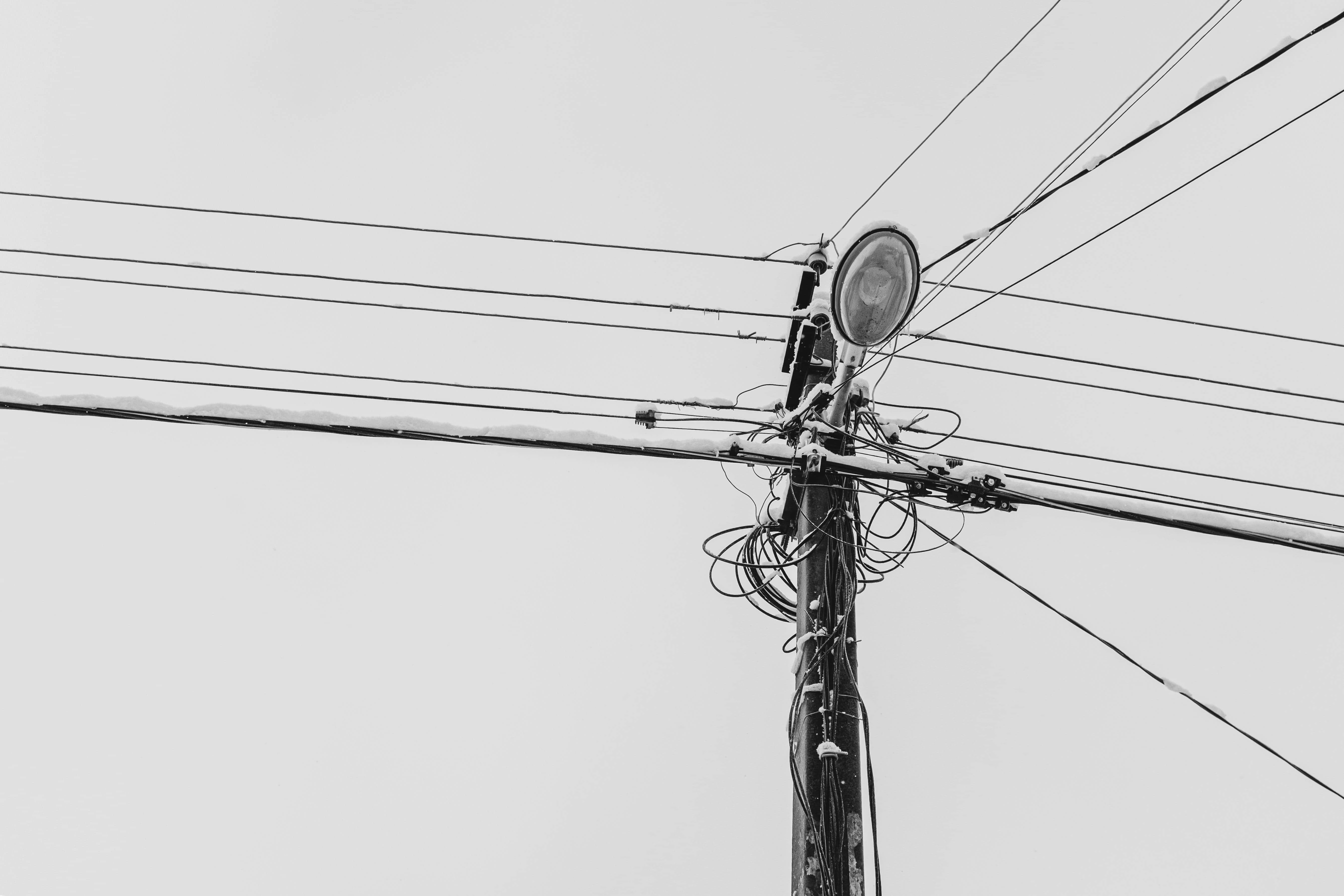
Average Electricity Bills in Every State [Ranks for All States + DC]
Which states pay the most for electricity and which states are best for energy bill savings?
In this article:
- Average Electric Bills Ranked for Every State
- Average Electricity Bills, Rates and Usages
- States with the Highest Electricity Bills
- States with the Lowest Electricity Bills
- What Causes High Electric Bills?
- Are Electricity Bills Getting More Expensive?
- Average Monthly Electricity Bill Since 2001
- Recent Posts
Let's take a closer look at every state plus Washington D.C.
Average Electric Bills Ranked for Every State
This map shows the average electricity bill for each state in the U.S. Hover hover a state to see more details.
Average Electricity Bills, Rates and Usages
| State | Rank | Avg Rate (kWh) | Avg Bill (Monthly) | Avg Usage (kWh/mo) |
|---|---|---|---|---|
| Utah | 1 | 10.44¢ | $80.24 | 769 |
| New Mexico | 2 | 12.94¢ | $86.66 | 670 |
| Colorado | 3 | 12.36¢ | $87.88 | 711 |
| District of Columbia | 4 | 12.63¢ | $88.89 | 704 |
| Illinois | 5 | 13.04¢ | $93.98 | 721 |
| Idaho | 6 | 9.95¢ | $95.04 | 955 |
| Washington | 7 | 9.87¢ | $95.72 | 969 |
| Maine | 8 | 16.81¢ | $95.77 | 570 |
| Montana | 9 | 11.24¢ | $96.49 | 858 |
| Wyoming | 10 | 11.11¢ | $96.59 | 869 |
| Wisconsin | 11 | 14.32¢ | $99.42 | 694 |
| Minnesota | 12 | 13.17¢ | $102.11 | 775 |
| Oregon | 13 | 11.17¢ | $102.32 | 916 |
| Ohio | 14 | 12.29¢ | $107.30 | 873 |
| Iowa | 15 | 12.46¢ | $107.78 | 865 |
| Oklahoma | 16 | 10.12¢ | $109.07 | 1,078 |
| Nebraska | 17 | 10.80¢ | $109.39 | 1,013 |
| New Jersey | 18 | 16.03¢ | $109.54 | 683 |
| Michigan | 19 | 16.26¢ | $109.86 | 676 |
| Arkansas | 20 | 10.41¢ | $110.33 | 1,060 |
| Nevada | 21 | 11.34¢ | $110.36 | 973 |
| New York | 22 | 18.36¢ | $110.47 | 602 |
| Vermont | 23 | 19.54¢ | $110.79 | 567 |
| North Dakota | 24 | 10.44¢ | $113.26 | 1,085 |
| Kansas | 25 | 12.85¢ | $113.52 | 883 |
| Pennsylvania | 26 | 13.58¢ | $114.90 | 846 |
| Missouri | 27 | 11.22¢ | $115.35 | 1,028 |
| Louisiana | 28 | 9.67¢ | $116.07 | 1,201 |
| Kentucky | 29 | 10.87¢ | $116.62 | 1,073 |
| California | 30 | 20.45¢ | $116.94 | 572 |
| Delaware | 31 | 12.56¢ | $117.09 | 932 |
| North Carolina | 32 | 11.38¢ | $118.44 | 1,041 |
| New Hampshire | 33 | 19.04¢ | $120.01 | 630 |
| Indiana | 34 | 12.83¢ | $120.34 | 938 |
| South Dakota | 35 | 11.75¢ | $121.77 | 1,037 |
| West Virginia | 36 | 11.80¢ | $124.09 | 1,051 |
| Maryland | 37 | 13.01¢ | $124.50 | 957 |
| Alaska | 38 | 22.57¢ | $124.66 | 552 |
| Tennessee | 39 | 10.76¢ | $125.70 | 1,168 |
| Mississippi | 40 | 11.17¢ | $128.08 | 1,146 |
| Florida | 41 | 11.27¢ | $128.64 | 1,142 |
| Georgia | 42 | 12.02¢ | $129.92 | 1,081 |
| Rhode Island | 43 | 22.01¢ | $130.75 | 594 |
| Virginia | 44 | 12.03¢ | $131.72 | 1,095 |
| Massachusetts | 45 | 21.97¢ | $132.18 | 602 |
| Texas | 46 | 11.71¢ | $132.59 | 1,132 |
| Arizona | 47 | 12.27¢ | $136.70 | 1,114 |
| South Carolina | 48 | 12.78¢ | $138.16 | 1,081 |
| Alabama | 49 | 12.57¢ | $143.95 | 1,145 |
| Connecticut | 50 | 22.71¢ | $161.55 | 711 |
| Hawaii | 51 | 30.28¢ | $162.66 | 537 |
States with the Highest Electricity Bills
These states had the highest electric bills on average:
| State | Avg Rate (kWh) | Avg Bill (Monthly) | Avg Usage (kWh/mo) |
|---|---|---|---|
| Hawaii | 30.28¢ | $162.66 | $537.00 |
| Connecticut | 22.71¢ | $161.55 | $711.00 |
| Alabama | 12.57¢ | $143.95 | $1,145.00 |
| South Carolina | 12.78¢ | $138.16 | $1,081.00 |
| Arizona | 12.27¢ | $136.70 | $1,114.00 |
| Texas | 11.71¢ | $132.59 | $1,132.00 |
| Massachusetts | 21.97¢ | $132.18 | $602.00 |
| Virginia | 12.03¢ | $131.72 | $1,095.00 |
| Rhode Island | 22.01¢ | $130.75 | $594.00 |
| Georgia | 12.02¢ | $129.92 | $1,081.00 |
States with the Lowest Electricity Bills
These states had the lowest electric bills on average:
| State | Avg Rate (kWh) | Avg Bill (Monthly) | Avg Usage (kWh/mo) |
|---|---|---|---|
| Utah | 10.44¢ | $80.24 | $769.00 |
| New Mexico | 12.94¢ | $86.66 | $670.00 |
| Colorado | 12.36¢ | $87.88 | $711.00 |
| District of Columbia | 12.63¢ | $88.89 | $704.00 |
| Illinois | 13.04¢ | $93.98 | $721.00 |
| Idaho | 9.95¢ | $95.04 | $955.00 |
| Washington | 9.87¢ | $95.72 | $969.00 |
| Maine | 16.81¢ | $95.77 | $570.00 |
| Montana | 11.24¢ | $96.49 | $858.00 |
| Wyoming | 11.11¢ | $96.59 | $869.00 |
What Causes High Electric Bills?
There are two factors that contribute to your electric bill. The cost per kWh you pay and the amount of electricity you use.
Cost Per kWh
This can be tricky to understand. There are several line items, fees, and charges on your bill. So what's paying for what?
For simplicity let's break up charges into two categories. Supply charges and delivery charges.
Supply charges are the fees associated with the actual energy you use. So if you pay 10 cents per kWh hour and use 1,000 kWh you would have $100 in supply charges. Just like on your water bill where you get charged for how much water you used. In deregulated states, you are able to shop around to find the best deal on supply charges.
Delivery charges are the fees associated with actually getting the electricity to your location. They generally include 3 things:
- Distribution Rate - The fee that covers the actual delivery of the electricity to your door via local power lines.
- Transition Rate - Usually a fixed amount that covers the financing that utilities need to invest in building power-generating facilities.
- Transmission Rate - Set by the Federal Energy Regulatory Commission this surcharge pays for the delivery of electricity through high voltage lines.
Your electric bill may have other items or fees, but at a high level these are the most common charges. If you see something you're not sure about call your provider or utility to get clarification.
Are Electricity Bills Getting More Expensive?
You aren't the only one feeling the burden of higher electricity bills. According to the EIA the average residential electricity rate has risen from 11.62¢ to 16.19¢ per kWh from 2010 to 2024. That is a near 40% increase.
This pricing directly affects your electricity bill. For instance the same bill for someone who uses 1,000 kWh in a month would have gone from $116 to $161 in the last 14 years.
This increase only gets more noticeable the more electricity you use. So if you are in an area with hot summers like Texas, you likely have a higher average cost because of how much electricity you use to run your air conditioning.
Average Monthly Electricity Bill Since 2001
This chart shows the trend line for the average electricity rate along with the average electric bill for 1,000 kWh and 2,000 kWh hours of energy usage.
| Year | Rate | Bill per 1,000 kWh | Bill per 2,000 kWh usage |
|---|---|---|---|
| 2023 | 16.19 | $161.90 | $323.80 |
| 2022 | 15.04 | $150.40 | $300.80 |
| 2021 | 13.66 | $136.60 | $273.20 |
| 2020 | 13.15 | $131.50 | $263.00 |
| 2019 | 13.01 | $130.10 | $260.20 |
| 2018 | 12.87 | $128.70 | $257.40 |
| 2017 | 12.89 | $128.90 | $257.80 |
| 2016 | 12.55 | $125.50 | $251.00 |
| 2015 | 12.65 | $126.50 | $253.00 |
| 2014 | 12.52 | $125.20 | $250.40 |
| 2013 | 12.13 | $121.30 | $242.60 |
| 2012 | 11.88 | $118.80 | $237.60 |
| 2011 | 11.72 | $117.20 | $234.40 |
| 2010 | 11.54 | $115.40 | $230.80 |
| 2009 | 11.51 | $115.10 | $230.20 |
| 2008 | 11.26 | $112.60 | $225.20 |
| 2007 | 10.65 | $106.50 | $213.00 |
| 2006 | 10.4 | $104.00 | $208.00 |
| 2005 | 9.45 | $94.50 | $189.00 |
| 2004 | 8.95 | $89.50 | $179.00 |
| 2003 | 8.72 | $87.20 | $174.40 |
| 2002 | 8.44 | $84.40 | $168.80 |
| 2001 | 8.58 | $85.80 | $171.60 |
Written by Thad Warren
Thad is a native Texan who has worked in the energy industry for just over 5 years.
Connect
Recent Posts
Road to Recovery: Fort Worth homeowners receive $27 million after 2021 Winter Storm Uri
Fort Worth residents are still recovering from the havoc caused by Winter Storm Uri in 2021, but now relief is on the horizon in the form of $27 million in grants.
September 2025

3 minutes

PPL Electricity Rates Climb Ahead of the Holiday Season
December 2025

4 minutes

Unlimited Electricity Plans in Texas: Here’s What it Actually Costs
Searching for unlimited electricity plans in Texas? On the surface, they sound perfect: one flat bill, no matter how much power you use.
August 2025

4 Minutes


.jpeg)
